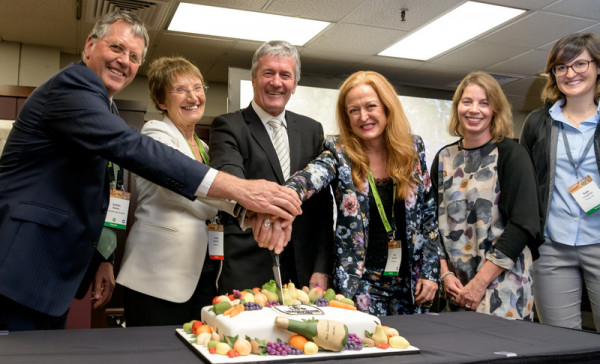Horticultural apprenticeship highlights career opportunities
3 August 2018
A newly launched Horticulture Apprenticeship scheme is an initial step towards alleviating a skill shortage in a sector crying out for capability throughout its supply chain.
Launched at the 2018 Horticulture Conference in Christchurch by the Minister of Agriculture, the Hon Damien O’Connor, the Apprenticeship in Horticulture Production was developed by Primary ITO.
Speaking at the launch, Julian Raine, the president of Horticulture New Zealand, says now is the perfect time to start a career in horticulture.
“Horticulture is the industry to be in. We have people wanting to join us and we need more people.”
He says the sector will require an extra 25,000 people within the next 10 years to meet its requirements and these people will need to be smart and tech savvy.
Primary ITO CE Dr Linda Sissons says the three-year apprenticeship programme, which will employ 100 people a year, is a first step toward creating a premium pathway for aspiring leaders in the horticulture sector.
The apprentices will be supported in their professional development by their employer, Primary ITO and off-site training providers.
“The apprenticeship signals to future talent that employers are willing to invest in their development.”
It also shifts the conversation from seasonal labour to a long-term career option in what is a buoyant sector of the economy.
The programme, which allows apprentices to earn as they learn, takes the different needs of the different industries within the sector into account. Apprentices will work through a typical season of whichever industry the apprentice chooses and this ensures they start at the right time for both employer and employee.

Cutting the cake to celebrate the launch of the new apprenticeships. From left to right: Julian Raine (President of Horticulture New Zealand); Linda Sissons (Chief Executive of Primary ITO); Hon. Damien O’Connor (Minister of Agriculture); Jen Scoular (representative for the Horticulture Capability Group); Nicola Crennan (External Relations Manager for NZ Winegrowers); and Kate Longman (National Group Manager, Horticulture at Primary ITO).
For Canterbury-based vegetable grower Robin Oakley the apprenticeship programme could not come soon enough. Employing 30 people full-time, he relies on holiday and Recognised Seasonal Employer (RSE) workers for his business to function.
Where he sees the void appearing is in senior management roles, as there are simply not the skilled people coming through to replace those nearing retirement.
While he appreciates the work done by the RSE workers who are only in the country for a short-term, he wants to see New Zealanders on a pathway to learn about the industry both on and off-farm and develop their skills.
“This is something that hasn’t come too soon.”
“It’s music to a grower’s ears, it’s rain and sunshine all at once.”
He says school leavers taking the opportunity to enter the apprenticeship will, by the time they are 21, have the knowledge and experience to hold well-paid positions within the industry.
“We have the positions that we need to fill now.”
Robin says the apprenticeship programme will give people the opportunity to learn about every aspect of the industry and gives them time to decide where their strengths and interests lie, whether it be in technology, hands-on growing and crop management or in the mechanical side of the business.
Wayne Hall from the NZ Citrus Industry welcomes the apprenticeship programme saying it provides security around future capability.
With low unemployment in many areas, the industry struggles to find enough staff to meet demand and citrus growers also rely on RSE works.
“I would love to employ locals and give them a career pathway.”
He says the first challenge is to identify those people willing to take on the apprenticeship and show them the rewards at the end.
“These are careers not just jobs.”
Like Robin, he says there are a huge range of well-paid job opportunities within the industry, particularly at managerial level.
“This programme is showing that there is a pathway and at the end there are rewards.”
NZ Winegrowers is one of the groups supporting the apprenticeship in Horticulture Production. External Relations Manager Nicola Crennan says the apprenticeship will help raise the awareness of the opportunities within viticulture and the wine industry, which is this country’s fifth largest export earner.
“There is a lot more to viticulture than pick, plant and prune.
“There are a lot of permanent, skilled career opportunities and progression pathways people don’t know about.”
People can start in the vineyard driving tractors and, with the right support and training, quickly progress to managing the vineyard.
While there has been a viticulture apprenticeship in place, this has been revamped by Primary ITO in conjunction with industry experts to help build capability in a sector that is undergoing rapid expansion.
Mike Arnold from LeaderBrand says as well as benefiting both employers and employees, the Apprenticeship in Horticulture Production does a great job in telling the story about the horticultural industry.
Skilled people have the opportunity to travel and work around New Zealand – and the world – and use cutting-edge technology.
“The technology is incredible, we have tractors worth over $500,000 that are like flying an aeroplane.”
The scheme offers employees long-term security for themselves and their families in an industry which is growing – both literally and figuratively.
The sector groups supporting the apprenticeship include; NZ Avocado, Vegetables NZ, Processed Vegetables NZ, Horticulture New Zealand, Apples & Pears NZ, NZ Kiwifruit Growers (represented by the Horticulture Capability Group), Citrus NZ, Potatoes NZ, Tomatoes NZ, Onions NZ, Pukekohe Vegetable Growers Association, Canterbury Horticultural Society and NZ Winegrowers.
Visit www.letsgrow.co.nz for more information on the new apprenticeship.

Our amazing 100 NZ Apprenticeships in Horticulture Production cake which represents our horticultural industry.
The time of the tradee
At the launch of the Apprenticeship in Horticulture Production, the Minister of Agriculture, Hon Damien O’Connor, says the apprenticeship offers a huge opportunity for kiwis.
Describing the programme as a pathway into management positions, he says people will clamber for careers in the horticulture industry if they see there is a good salary on offer.
It is, he says “the time of the tradee” and while NZ had plenty of lawyers and accountants, the country needs more trained professionals to meet industry needs.
O’Connor’s comments were backed up by Dr Linda Sissons who says BERL research has shown that over a lifetime, those who go through apprenticeships end of financially better off than university graduates.

Auckland tomato grower Reupena Kovati.
Auckland tomato grower Reupena Kovati credits the apprenticeship schemes available back in the 1970s for giving him the skills he needed to work in the horticulture industry and eventually own and operate his own business.
It was a teacher in Reupena’s native Samoa who recommended the young school leaver to two nurseries in Ellerslie where he served his apprenticeship and built a solid skill base.
While he returned to Samoa and married, Reupena and his wife returned to NZ and the couple started their own business growing flowers, vegetables and pot plants.
They are now growing low-acid tomatoes in Glenbrook, producing 150-200 boxes a week from 3,500 plants between September and June.
He says the low-acid tomatoes are a niche product and are particularly sought after by those with diabetes, gout or people choosing low-acid varieties for health reasons.
